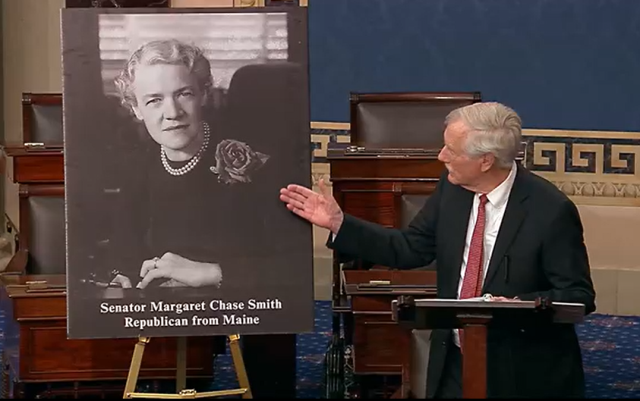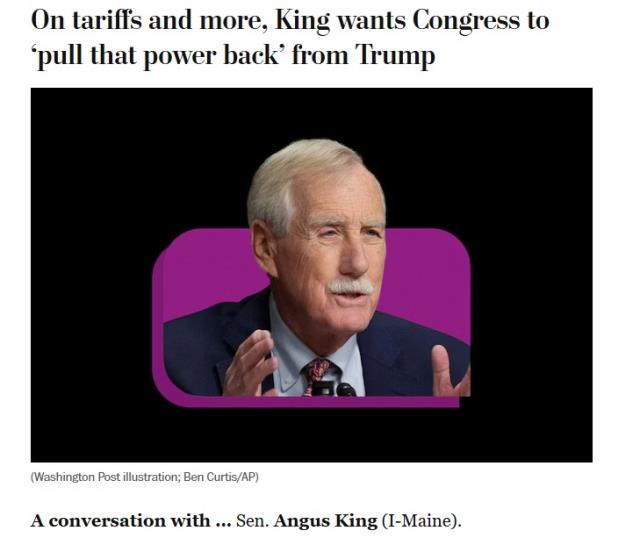Honoring the Leadership and Bravery of Margaret Chase Smith

Honoring Margaret Chase Smith's leadership and bravery on the Senate floor
Two hundred and fifty years ago, American silversmith Paul Revere embarked on his historic ride, dashing on horseback from Boston to Lexington, Massachusetts. All along the way, he alerted the colonists and the Minutemen militia of the imminent attack upon our fledgling nation by the British Army.
And almost 75 years ago, the junior Republican Senator from Maine, Margaret Chase Smith, rose in the Senate chamber to deliver a speech from her heart about a crisis then facing our country, a crisis not arising from a foreign adversary but from within.
At the time of Senator Smith's speech, the anti-communist crusade threatened the values and ideals at the base of the American experiment. Smith’s ‘Declaration of Conscience’ turned out to be one of the most important speeches of the Twentieth Century and defined her for the ages as a person of extraordinary courage and principle.
You see, throughout American history, we have been faced with threat after threat to our fragile democracy. So I've decided to follow in Revere and Smith's footsteps to 'sound the alarm' on the latest crisis. Earlier this week, I spoke on the Senate floor tor remind my colleagues of Senator Smith's warning, outlined the current crisis facing our system of government, and issued my own 'Declaration of Conscience.'
From the Senate chamber, to the streets of Portland to computer screens across America, it is our responsibility to stand up and fight back against this existential threat.

Discussing the importance of Paul Revere’s ride with Heather Cox Richardson
The cumbersome nature of our system is not a bug—it is the principal feature which the Framers relied upon to protect the liberties of our people from the inevitable abuse inherent in the concentration of power. Madison put it succinctly in Federalist 47: “The accumulation of all powers, legislative, executive, and judiciary, in the same hands...may justly be pronounced the very definition of tyranny.” Later in the same essay, he defines the stakes: “There can be no liberty where the legislative and executive powers are united in the same person.”
Learning from these lessons of our Founding Fathers, I spent time with fellow Maine person, and renowned historian, Heather Cox Richardson, on the similarities between the American Revolution and the revolution we are finding ourselves in now. What we discovered is that this is not just a lesson in history from 250 years ago, but also a moment of reckoning for the direction of our country in the next two and a half centuries.

In conversation with the Washington Post
When we take a step back from the daily onslaught of bad headlines — from tariffs to climate change and more — we realize that we are currently facing a 'five alarm fire.' What we’re seeing is a fundamental restructuring of the way our government was designed, contrary to the desires of our founders, that basically is moving more and more power to the Executive Branch.

Speaking at the Hands off Rally in Portland
Echoing Senator Smith's famous speech, today’s crisis should not be viewed as a partisan issue; this is not about Democrats or Republicans, or immigration or tax policy, or even the next set of elections. Today’s crisis threatens the idea of America and the system of government that has sustained us for more than two centuries.
Again, this is not about the President’s agenda, it’s about the manner in which he is pursuing it—which includes ignoring the Constitution and the rule of law—and it’s this roughshod non-process that endangers all of us, his detractors and supporters alike.
What’s at stake is simple and, in fact, was the driving force behind the basic design of our Constitution—the grave danger to any society of the concentration of power in one set of hands.
Two hundred and fifty years ago, Americans were roused to action when a threat was approaching, and they stood firm against the loss of their liberty. Today, We the People face a new threat, and it’s up to us to stand once again in defense of our country.
___________________________________________________________
Supporting Maine’s Fisheries and Foresters

Maine’s fishing and forestry industries are more than just the pictures tourists see on pretty postcards (although the fishery I visited in Bremen is quite spectacular!).
There are so many hardworking folks and small family businesses that bring these essential Maine products from the depths of our state to grocery stores and factories across the globe. Yet, with the uncertainty our local industries are facing during these unprecedented economic times, I am prioritizing legislation to protect our lobstermen and women and foresters.
So I introduced the Fishing Industry Credit Enhancement Act which would allow fishing-support businesses to access the loans of the Farm Credit System like similar small businesses working with livestock and crop farmers. These reliable loans unlock rural economies, and help businesses invest in new expansions. Opening this program to the men and women who put fish on grocery shelves and kitchen plates is a smart way to help them hire more workers, and modernize operations to meet the demands of the 21st century economy.
The FCS was founded in Congress in 1916 to help farmers who historically struggled to access reliable credit and has since provided almost a million loans totaling more than $373 billion to farmers, ranchers, fishermen, aquatic producers, and more. Borrowers must meet eligibility and creditworthiness requirements. It currently provides more than one-third of the credit used by those who live and work in rural America and I am hoping that it quickly becomes accessible to the small businesses in Maine supporting our iconic fisheries.
Maine’s forestry industry has also been foundational for our state economy for generations, and we want to continue to support it for many years to come.
Yet, as the industry continues to evolve, we must ensure our forestry workforce has the proper training and skills to help responsibly manage our forests while strengthening our local economies. The bipartisan Jobs in the Woods Act is commonsense legislation that will invest in new and innovative workforce programs — helping Maine people get quality, good-paying jobs and securing the future of our state’s iconic timber industry.
___________________________________________________________
Paying Back our Veterans

Maine Veterans' Homes (MVH) in Augusta
In case you've read this far down, I want you to know that there is some good news to share.
For decades, Maine Veterans’ Homes (MVH) has provided quality care to Maine veterans; working hard to make good on our nation’s promise to give back to those who served.
However, since 2021, Maine Veterans’ Homes (MVH) has not received full reimbursement from the Department of Veterans Affairs (VA) for the domiciliary care it has provided to veterans. In 2020, Congress passed legislation authorizing the VA to cover the costs of nursing home care provided by state veterans’ homes for veterans with early-stage dementia after it abruptly stopped covering these payments in 2019. Unfortunately, the VA delayed the required rulemaking by more than two years. This lag forced MVH to pay out-of-pocket for the care costing approximately $130,000 per month and over $3 million since 2019.
Domiciliary care was established by the VA after the Civil War as a type of assisted living that is provided to older veterans who are independently mobile, or semi-mobile and incapable of living alone. Over 115 MVH residents receive domiciliary care, 80 percent of whom are on Medicaid.
This month, and together with the entire Maine Congressional Delegation we shared that MVH has finally received full reimbursement from the VA for this care — an important step that will ensure its doors can stay open, and our veterans can continue to access important care and support.
This is a great win for team Maine and I hope we can continue working together in support of our state's most honorable citizens. |